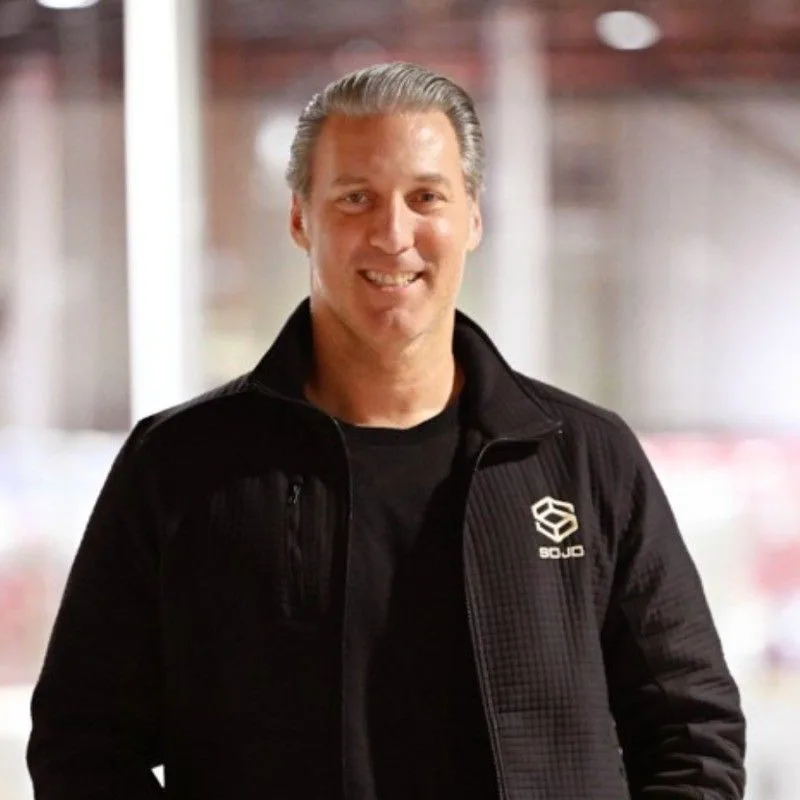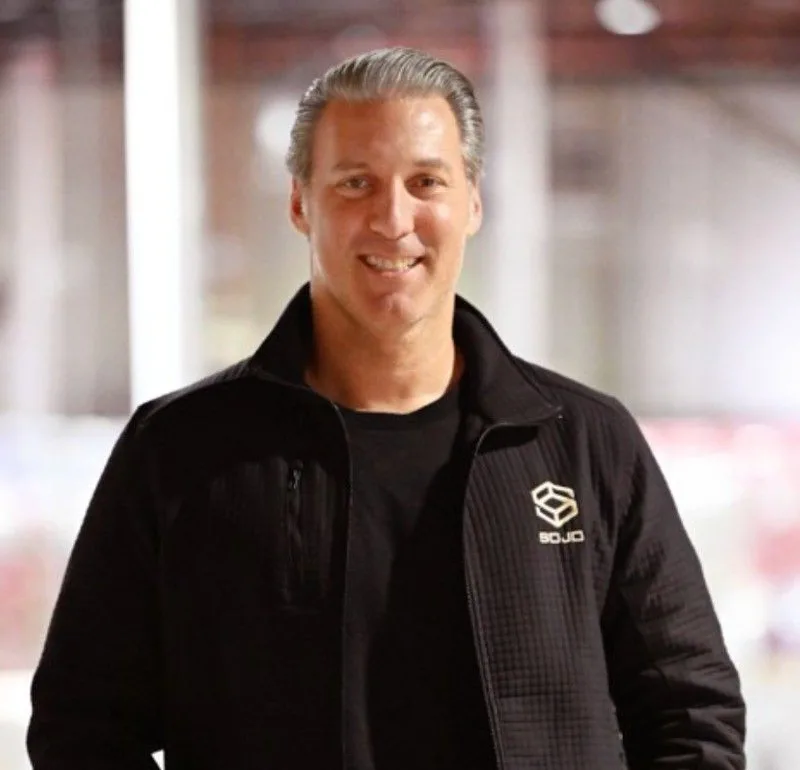CPG industry veteran Barak Bar-Cohen believes tech and robotics have the ability to lead the food and beverage industry to the cutting edge of future trends.
Bar-Cohen launched Sojo Industries, a manufacturing company using robotics that works with food and beverage businesses to create “variety packs” to be sold in bulk for products like snacks and beverages, with a focus on driving down emissions created within the food supply chain. Bar-Cohen said his late father, Dr. Avi Bar-Cohen, an expert in thermal science who worked with NASA on mobile roving units used for missions on the moon and Mars, inspired him to implement automated machinery into his new company.
In an interview with Food Dive, Bar-Cohen said the challenges food and beverage companies currently face, from keeping up with consumer trends to driving down emissions, can be tackled with the help of robotics technology.
Bar-Cohen served as the chief operating officer of better-for-you beverage maker Bai Brands from 2012 to 2017. That year it was acquired by Dr Pepper Snapple (now Keurig Dr Pepper) for $1.7 billion.

Barak Bar-Cohen, founder and CEO of Sojo Industries.
Courtesy of Sojo Industries
FOOD DIVE: After your experience in the C-suite at a large beverage company, what made you want to enter manufacturing?
BARAK BAR-COHEN: I was an early investor and the chief operating officer at Bai Brands. I did 100% of our variety packing in-house. Forty to 50% of the volume was variety packs, and it was really hard to manage that because over 80 percent of the industry is still manual.
We could not wait to get into more automated ways of doing business. We ended up buying a big robotic cell, but only ran it for six or seven months, and then ended up selling the business and that went with it. For a couple of years after leaving Bai I just kept getting call after call from friends in the industry, brands and people that I’ve worked with asking about variety packs. “How did you guys do it at scale? And how did you manage the multiple touches and all the pain points that come from, from the variety pack world.”
My dad had unfortunately passed in October 2020, and I was going through a lot of his publications. He was one of the top people in the world in heating and cooling of electronic components and got his PhD at MIT. I noticed that he had worked a lot on NASA projects, to Mars and had had to do a lot with the just the variances in temperature, which was his expertise: the reentry into the atmosphere, and all the material properties associated with that, and then the cold in space, and then stuff landing on multiple planets. And I noticed he worked on the mission to Mars, on July 4, 1997, which was the first actual robot to land on another planet. The name of that robot was Sojourner, named after African-American abolitionist Sojourner Truth.
I had the aha moment looking at the robotics and thought, why not take a page out of the wine industry, where a lot of the corking and bottling comes to the vineyard, right, not the other way around. Why not use mobility and robotics to solve this problem in the variety pack world. We shortened Sojourner to “Sojo” and filed a handful of patents around the anchoring level empowering and transporting of robotics and automated lines to other locations. I also needed a bricks and mortar environment just to start, so I got a 100,000 square feet location in Bristol, Pennsylvania, and decided I needed to get the band back back together. So I went ahead and called the the operators, forklift folks, engineers and commercial gang that I’ve worked with.
Since the beginning of the year, we’ve taken 635 metric tons of CO2 out of the atmosphere as a result of the fact that we brought lines onsite and we didn’t have to have trucks shipping things all over the world, which is the equivalent to 418 flights from Newark to LAX.
We’ve also been playing really close attention to the FDA’s Food Safety Modernization Act changes that are due to go into full effect January 20, 2026. We are trying to get ahead of of that and bring a more technology driven mindset to solving some of those problems. So if you can do those things, I think you’re building something special, you’re really building a technology business that is solving a huge problem in the variety pack world, and sort of applying that mindset to an industry that’s still mostly manual labor. For us, today it’s beverage, tomorrow it’s food, the next day it’s health and beauty. I see this world of variety packing is manifesting across industries.
FOOD DIVE: Coming from Bai, what did you learn that you are now applying to Sojo?
BAR-COHEN: Since I’ve made every mistake there is to make at least twice, sometimes three times, I can tell you what not to do. In a startup environment like this, I’m in a tough economic climate with a lot of moving pieces, especially freight, logistics, real estate, commercial and industrial. With all that stuff moving around, knowing what not to do can can be valuable. I think all those experiences sort of brought me a lot of insights on how to navigate in that environment.
At Bai, I ran all the production quality, operations, logistics, freight, all the copacking relationships, and I built a hub and spoke model, where 100% of all of the byproduct that was produced was produced within about a one hour radius of a 275,000 square foot distribution center that we built out in Bordentown, New Jersey. We did that in order to maintain control in order to optimize speed and optimize freight.
We also got to the point where the entire time at Bai, there wasn’t a single bottle of Bai that was produced and tasted by a customer that wasn’t first tasted by a certified taster at the company. So every single batch was was tested for all the quality metrics that you look at.
There are still instances, due to scale and proximity, where you want to be able to control things in a brick-and-mortar environment and invest in robotics and automation to do things at high scale and get those efficiencies. With Sojo, we’ve got a facility in Pennsylvania, another in Redlands, California, and we’re also launching in Indianapolis.
I like to think that we treat every brand and every customer as if they’re our own because we have been there before.
FOOD DIVE: How are current trends driving changes in the food and beverage supply chain?
BAR-COHEN: As far as consumer trends and demand, I’m just seeing more and more and more demands for variety and multipacks, different combinations to fulfill different needs. So in alcohol, the White Claws, the Trulys, all of these upstart and established brands in hard seltzers are doing somewhere between 80 and 100% of their sales in variety packs, in grocery stores, liquor depots, all that kind of stuff.
Especially with the younger consumers that are coming into the marketplace, people want what they want, when they want it, delivered through multiple channels. I see that just continuing to accelerate, especially in beverage. I think part of what’s driving that is just much better data. You’re no longer just getting your weekly Nielsen and IRI, you know, once you get to a certain point, your ACV points and your velocities and all that kind of stuff, that’s great. But when you’re investing heavily in all your digital marketing channels, when your TikTok channel is driving sales, and when you’ve launched your entire brand, online and you’re reaching that demographic of that consumer, the advantage is you’re just getting exceptional data. And I’m seeing brands bring on business intelligence folks really early in their lifecycle because now they’re able to target and say “This works with that consumer, this works with that consumer, what about this combination?” Slap on innovation and new combinations, you slap on Amazon, and you drive traffic to your own website and drive comments within a week as to whether you did something good or you did something bad, and then you’re sort of iterating on top of that.
Unless you’re Coke, Pepsi, Nestlé and some of the larger alcohol brands, you as a brand don’t own your means of production. You don’t make the ingredients, you don’t own copacking, warehousing or distribution on trucks. You don’t own the retail channel at the at the end that the consumer touches. So you’re in a position where if you want to respond quickly, to good things, and not so good things, you need track-trace data.
You’re gonna have to use technologies like blockchain in order to shore up and track things going on in your in your supply chain, which is what we’re aiming to do at Sojo.
FOOD DIVE: How do you think Gen Z is reshaping the approach of beverage companies?
BAR-COHEN: When we launched Bai and really started to get some traction, we went after Vitamin Water. That was the gorilla out there, and it had developed a product that looked very medicinal on the front. You felt like you could trust it because it looked like it should be good for you, but when you turned it around, you saw 36 grams of sugar. Consumers at that point was shopping the front of the label, and at Bai we’re trying to get people to shop the back of the label. We showed an adventurous journey of discovery with with the coffee beans and fruit regions we sourced from. But really, it was about five calories and one gram of sugar, and if you looked at the back of the label, that was amplified. We skewed a little bit more female, so we were speaking to the Millennial Mom.
Now I’m seeing brands reinvent themselves. You have to be able to speak to healthy hydration. At Bai we didn’t have to speak as much to organic or GMO. Now you have to be able to speak to that because that’s a prerequisite for the younger demographics to know that things they’re putting in their body are good for them, generally speaking. But now you also need to add to that the climate responsible element to it. And so I’m seeing those things proliferated into areas like alcohol as well.


